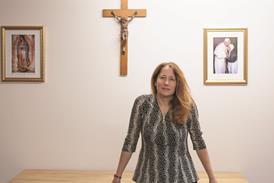There’s a new breed of church arising in the United Kingdom. They’re urban; they’re large and they have a strong accent on work with families, children and social compassion.
This group of churches, which includes Kensington Temple (London), Sunderland Christian Centre, Frontline (Liverpool), are not part of a formal coalition, but they seem to share common commitments to outreach, creativity and training. Perhaps the most high profile at this time is Abundant Life Bradford, a 2,000 strong independent church which finds itself at the heart of a network of over 100 churches that share its three core values: God Centred, People Empowering and Purpose Driven.
The roots of the church will be familiar to those who have studied the British church in the last 30 years. The Harvesttime network, one of the main sponsors of the Dales Bible Week, was a key part of the new church movement. The home church of the network, for many years, was Church House Fellowship, Bradford, under the leadership of the late Bryn Jones. Even before Church House came into being his brother Keri led a 15 year old schoolboy named Paul Scanlon to Christ.
Paul was to eventually emerge as the leader of the Bradford church. In 1998 the church left what was by then called Covenant Ministries network, renamed themselves Abundant Life and started the sometimes painful process that was to lead to growth from 300-400 to over 2,000 at their three weekly meetings.
In six years the church, now with a staff of 37, has emerged into national visibility. It has regular slots on worldwide Christian satellite TV and distributes over 200,000 items of resource material per annum, including best selling worship albums from Lara Martin and her team. Add to this the hosting of a cross section of national conferences, and it becomes clear that Abundant Life has emerged as a ‘resource church’ for hundreds of others.
Three missing jewels
The bedrock values of the new church that arose from the previous congregation were established during a year long process of reflection. Paul was responding to invitations in a cross section of churches, reading a great deal and talking to a cross section of leaders and lay people. Returning from a preaching trip his team began to brainstorm. “We wrote down what had challenged us, encouraged us, frightened us, and bothered us as we had observed the UK church. 50 headings emerged. We reflected on those and eventually condensed them into what we have come to regard as three jewels that were missing in the church’s crown. “We felt by and large that much of the church had ceased to be God centred, purpose driven and was sadly lacking a commitment to people empowering. Large sections had become people centred, performance driven and people controlling. From our experience in that period much of the church had certainly ceased being purpose driven. We’d sat in endless meetings that lacked purpose, clarity and focus. “ On the issue of people empowerment, Charlotte Gambill, who plays a significant part in the teaching ministry of the church and its overall administration, takes up the theme. “This lunch time over 100 homeless and desperately needy people from the inner city gathered here for a meal.
Most of their lives they’ve been told you’ve got no hope, and no future. But here they begin to discover that they are loved and valued, that they can make a difference and can get involved in helping others. And that’s where empowerment starts, with the belief that your life can make a difference.”
She turns to Lara Martin, the energetic and earnest worship leader at the church. “Lara came here from a job in a jewellers. She is writing songs that are touching the world. They were always in her heart, but she’d never been empowered to share them.
“We say to people, here your life can be changed. Not necessarily because you’ll be prayed for or receive an instant miracle but because we’ll teach and model how to live an empowered life: one where you can say no to drugs and no to the abuse. The first time you were abused you were a victim but every time after that you were potentially a volunteer. So stop volunteering! You’re empowered to say I want to live a different life, I want to get a job, I want to change the way I think and I want to think bigger. I know that sounds simple, but it is missing from so much of the church across the country and the world.”
This is a key theme and the team passes the verbal baton to one another, eager to make the point. Paul interjects, “I think that culture, once it catches a hold, allows people to believe that God’s made everybody good at something. It’s our job to create a culture of empowerment where that something, you either discover for the first time, or you go back and collect it because you left it dormant, not knowing how it could be used for God.”
Being God centred, another core value of the church, is vital to understanding the church’s worship. “I believe that everybody will worship something because that’s the way we’ve been put together,” comments Lara Martin. “As a worship team and as a worship pastor we’re committed to being God centred. I’ve found that a lot of songwriters write songs that are more about themselves, self-centred, rather than God centred. That’s why we’ve committed ourselves to developing worship that magnifies God rather than ourselves.”
Being a purpose driven church is also woven into the fabric of Abundant Life. Associate Pastor Stephen Matthews, who directs the teaching programmes across the church and heads the full time Abundant Life Leadership Academy, calls for churches to close the gap between talking about purpose and living with purpose.
“At the Academy the whole curriculum is built on our three core values. I’ve observed over the years that unless people connect with the purpose driven value, they still don’t do anything. It’s not enough to just empower people and say you can live your dream. They’ve got to know why they’re doing it. They need a context. They need to know that as empowered, God-centred people they have to get busy playing their part in outworking God’s purpose for them as individuals, the church and the extension of God’s kingdom in the world. In a nutshell, we are empowering people to live a God centred, purpose driven life. And what could be better than that!”
On the Buses
The church’s decision to purposefully engage in reaching the lost, particularly inner city families, was an important catalyst that shifted the spiritual axis of the church to the unchurched. Inspired by reading about and visiting Tommy Barnett’s bus ministry (an important mentor of the Kidz Klub pioneer Bill Wilson), they started to bring families in on buses from all around Bradford. After reading Barnett’s book, Paul had felt God was nudging him to start a bus ministry. Out walking the dog one day he asked God for a sign as he wrestled with the thought that it might be a good idea but not God’s idea.
As he turned toward home he noticed a piece of paper torn out of a child’s textbook, gleaming in the sun. On the paper were written three things.
Number one, transport is extremely important. Number two, because of it the population exploded. Number three, because of that, prosperity came to the city. A child’s classroom notes. “I was shocked,” said Paul. “These things don’t normally happen to me, but I felt I had my sign.”
Charlotte takes up the story: “When we launched the bus ministry some of the kids would swear at the stewards and use hand gestures that were not in the Highway Code! They just disrupted so many of our cosy patterns. They and their families challenged us about the way we presented the gospel, the language we used.”
Paul warms to the subject. “Before we were ‘virtual reality’ reaching the lost. We sang about it, prophesied about it, we interceded for the lost, we wept over the lost, but nobody ever spoke to anybody that was lost. I knew we were too safe one Sunday when I noticed that our people would walk off and leave their belongings on their seats while they talked to friends – coats, bags, house keys, car keys, mobile phones – the lot. They obviously felt safe.
But if there had been more unsaved people in the room, I suspect they would have been more careful.”
The ongoing impact that flowed from the decision to get involved in the bus ministry related to the fact that Abundant Life had started to become ‘embedded’ in communities around Bradford. They were and are restocking society with Christian compassion through creative outreach and creativity.
Some of this was a simple promotion of the church’s name. Billboards around the town and perimeter adverts at the Bradford Bulls stadium helped lodge the church in people’s minds. This helps when the human contact at the heart of the gospel is initiated. When they go door to door with a new project they don’t have to spend so much time explaining who they are.
Paul recounts his amazement at the responses they received. “I could not believe how hundreds of people got on those buses. We’d go door to door and say we’re from Abundant Life, and they might already be aware of us because we’re already working in their community with food programmes, clothing banks, schools work, advice, support and so on.
“We would hold ‘threshold’ events such as a BBQ, or a carnival day and offer them a free ride to the event on the buses. We find that the second wave of interest is bigger and faster than it is with middle class people. The people we were reaching from the inner city seemed to have bigger social networks.
Sometimes every seat on a mini bus would be taken by one extended family.”
One of the reasons the church has a high profile in the local community is the sheer number of ministries and projects they are involved in. Newcomers to the church will discover over 160 projects that they could be a part of. These include 39 Community action projects. In an average month the church will have contact with between 10-20,000 people.
Here is snapshot from their statistics of people reached in May 2003:
Fed 2,000 people
Gave clothing to 1,000
Helped 3,500 through training and advice programmes
Visited 2,000 people
Helped 160 working girls with food, clothing and practical advice via red light teams
Visited 600 prisoners
Re-housed 5 people
Helped 25 people through a drug rehab programme
Bussed in 1,500 people to church and events
Spoke to 6,000 children via their special solvent abuse awareness programme in Bradford
While the bedrock values of an evangelical charismatic church are still in evidence at Abundant Life, Paul and his team believe that some contemporary spiritual models will not help the unchurched or the new convert.
Paul is at his most animated now. “We don’t believe that the widespread practice of many charismatics who build their lives on supernatural guidance, prophesying and laying on of hands is helping us build a relevant 21st century church. While not abandoning these things, because they have their place, we believe that people should build their lives on a foundation of daily obedience to God rather than what is often super-spiritual flakey guidance. People need wisdom for life as they try and build a great marriage, tell the truth, live in integrity, love their kids, be at work on time, and pay their bills.”
Avoiding the quick fix mindset
Paul seems to have moved from the ‘flash flood’ version of revival to the long term renewal associated with the ministry of Wesley and Whitefield. He’s cut himself off from the ‘revival now’ mindset.
“Uncoupling my soul from all of that stuff has left me able to settle down, for the rest of my life, to build this church on biblical principles of wisdom for life and the development of our seemingly much undervalued godly common sense. I want to build a church that understands the scripture which says, ‘the steps of a good man are ordered by the Lord.’ Not the quantum leaps or giant bounds but his daily steps. Each day is a step and for most of the time, change doesn’t come from a quick fix found in a prayer line, it is a process of making right, responsible choices.
“We want to hear people say, I got some new software programming, I gotaround a new culture, met some new friends, got some fresh options and now I have the power to make some different choices. Step by step, over a period of months, I achieved this by obedience to the will of God. We want to empower people to know how to fish rather than giving them a fish; we want to give them a hand up not a hand out.”
Paul and his team are committed to relevance. “Churches have been choosing bait for years that people won’t eat, and then they wonder why they’re not growing. What’s relevant in our church world is not necessarily relevant to theirs. It’s the fish that choose the bait, not those doing the fishing!”
They’ve decided to build a church where the unsaved person’s perception is a key to their planning. You see it in the buildings (one of the biggest women’s toilets in Britain, according to my female friends), the music, the coffee shop (Starbucks quality), the literature, the furniture (best pastor’s vestry I’ve ever been in), the 160 ministries, the staffing (everyone dressed smart casual), the photography, artwork, and paint colours, (fashionable matts).
Paul, ever the realist, is wary of shallow, quick fix solutions but is motivated by working towards longterm change in our communities. “I believe we can see a new generation grow up that sees a cycle of despair broken. If we rescue a working girl from the streets who had given her life to prostitution, a cycle is broken. Now her children may not be on drugs by the age of 13 and on the streets themselves a few years later. Instead, they are the first of a new generation of believers. Some time ago we first met a 12-year old boy who’d been expelled from school. His parents, teachers and governors had given up on him. One day he got on one of our buses, came to church and gave his life to Christ. Now, one year later, he’s back in school and has received an award for the most improved student presented by his teachers and the school governors. The cycle in his life has been broken.
“Over a generation we can dislodge long-standing strongholds of thinking. It’s a fantasy to believe that if we pray, wave our hands in the air and shout in tongues, our cities will turn to Christ. If we don’t commit long term to making a difference to people’s lives then we will not have a lasting influence on our cities. However if we do, then maybe in the next 20 years we will be able to realistically say, without bravado or fantasy, we have changed our city.”
Spiritual fathers are important
Paul Scanlon found faith as a 15-year old teenager. The formative role in his life of a spiritual father figure was vital. Keri Jones had moved from South Wales up to Dewsbury to start teaching RE and PE. His arrival was to spark spiritual renewal in the school and provoke many discussions. One lunch time Paul Scanlon told God he wanted to ‘give it a shot’. Along with his friends he joined the local Pentecostal church and proceeded to shock the faithful. “We were all heathens, not anywhere near sanctified yet, so that was quite an experience for them”.
Keri was to remain a key figure in Paul’s early Christian life. “His personal integrity and his family life was an example to us. He opened his home to us as young guys coming from some of the really rough, poor, deprived council estates of the community. We did not see much functional family life on the estates so Keri’s home and family were an inspiration to us. We lived in grinding poverty quite often - shared beds, outside toilets, graffiti covered walls. In the midst of all that, I was being helped to see a better model of marriage and family and stability and faithfulness. It influenced me much more than I realised at the time.
“Our church pastor was an evangelist and he involved us in street evangelism. I didn’t know I wasn’t supposed to like evangelism! We went out every Friday and Saturday night. I was totally naïve. I sometimes quoted things and said they were from the Bible like, ‘a bird in the hand is worth two in the bush’ because it sounded like it should be in the Bible! But we learnt, we grew, and I honestly think that to this day, one of the reasons that I’ve never had a fear of sharing my faith was because of those early years on the streets, just doing what seemed to be normal and natural.”
Paul eventually became part of the Bradford church that Keri Jones’ brother Bryn was leading. His role in what is now one of the biggest churches in the UK was not part of some overnight spiritual fast track situation. Now at 46, Paul has been active in his local church for over 25 years in some form of leadership. He can look back on an apprenticeship that included leading the ‘bog squad’ cleaning team, worship leading, small group leadership, youth leadership, occasional preaching and eventually senior leadership of his local church.
He is anxious that young people are bought into responsibility early. “God told me very clearly to empower young people and that to do this I would need to work on their confidence. I committed to bring through young people, two examples of which are Lara (worship leader) and Charlotte (preacher/teacher). Most of our staff come from that same generation of teenagers that I began to work with 10 years ago. Now they are on staff their gifts and callings are making an impact through the work of all we do at Abundant Life.”



























